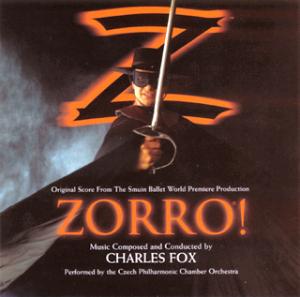************************************************************** EDITOR’s RECOMMENDATION June 2003 **************************************************************
Zorro Original Score from the Smuin Ballet
World Premiere Production
Music by Charles Fox
Performed by the Czech Philharmonic Chamber Orchestra
conducted by the composer
Available on a Promo Album (Warrior Productions) CFCD 01 Running Time: 53:30

Born in New York and musically educated in Paris (with Nadia Boulanger), Charles Fox’s work in film and TV has earned him two Oscar nominations and two Emmy Awards. Collaborating with choreographer, Michael Smuin he has written music for two ballet scores: A Song for Dead Warriors (also reviewed on this site this month) and Zorro.
This Zorro is somewhat different. He emerges from the screen to help movie usher Emilio capture the heart of Rosa, the beautiful theatre ticket girl, finding himself pitted against the machinations of the lecherous theatre owner.
Fox weaves a colourful, brilliantly-orchestrated, Latin-orientated score redolent of the excitement of the movies and the sword-fighting, whip-lashing early Californian hero of the title. In addition to the heroics, there is tongue-in-cheek comedy, pathos and romance woven into Fox’s imaginative score. Diverse influences include, to my ears: Leonard Bernstein (in West Side Story mode), Elmer Bernstein, Copland, Ravel, Bax, Prokofiev and Respighi. Highlights include a most amusing tango for ‘Emilio and Rosa’ as prickly as two porcupines encircling each other; the exuberant high-stepping ‘Movie Goers Dance’; and the dreamy, haunting ‘Zorro and Rosa Pas de Deux’, amazingly reminiscent of Bax’s Third Symphony Epilogue. ‘Don Diego’ emerges to music very like the orchestral introduction to Act III of Puccini’s Tosca and proceeds in a direction towards Shostakovich and Prokofiev. ‘Ballroom Scene’ continues these latter influences; this is at first military rather than romantic music before castanets and waltz rhythms soften the mood somewhat and then all hell is let loose with presumably Zorro intruding and triumphing to romance Anna. ‘Emilio and Theatre Manager – Fight Scene;’ is all comic, heroic irony and the ballet score ends with another dreamy, romantic Pas de Deux for Emilio and Rosa.
Amusing and exciting, great fun.
Ian Lace
4
Return to Index